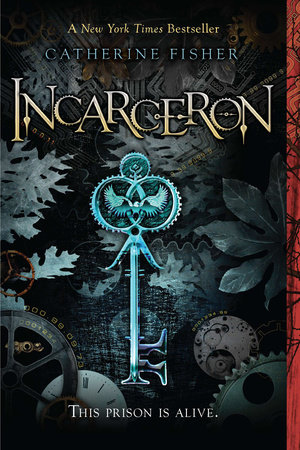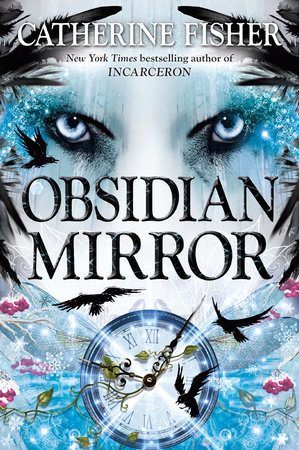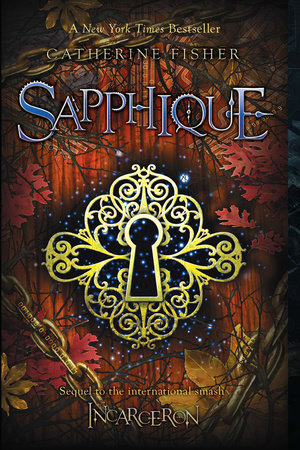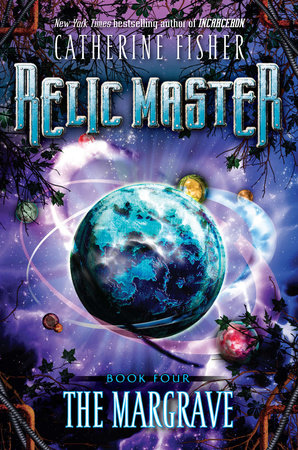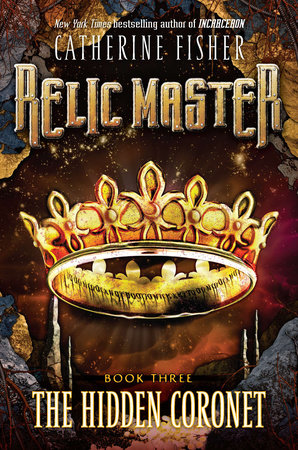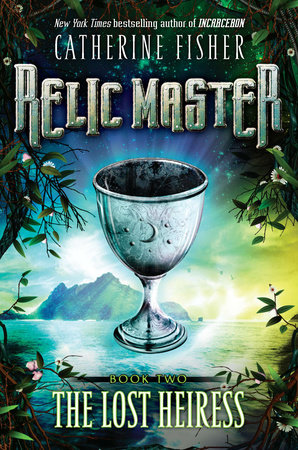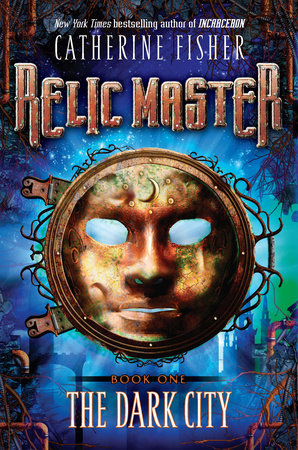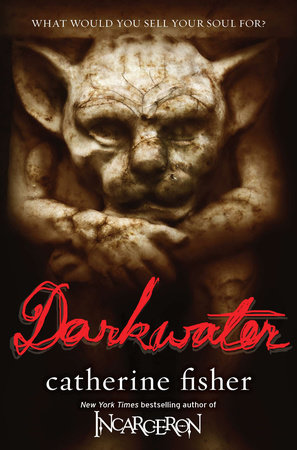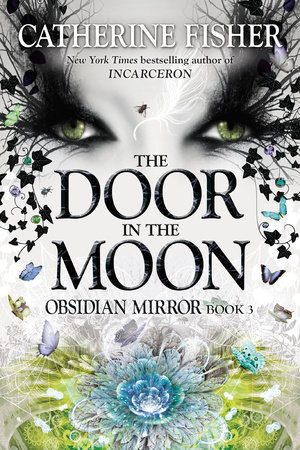
Circle of Stones
Suspense, mysticism, and history encircle three separate but related narratives in this fantasy novel. Today, Sulis, a teenage girl with a mysterious past, arrives in Bath with a new identity, trailed by the person she's trying to outrun. In 1740, Zac is apprenticed to an architect obsessed with Druidic mysteries, but has his own secret—and destructive—agenda. In ancient England, a druid king discovers the healing waters of a magical spring, where he founds a great city, and the heart of Fisher’s story. Through each voice, the mysteries are revealed, linking Sulis, Zac, and the king through the circles of time.
- Pages: 304 Pages
- Publisher: Penguin Young Readers Group
- Imprint: Dial Books
- ISBN: 9781101593363
An Excerpt From
Circle of Stones
the Improvement of the City by Building.
Bladud
Stop now. To go further is dangerous.
The circle is the oldest magic.
If you enter it, it will enfold you.
My name was forbidden. No one spoke its syllables to me anymore. No one touched me, or held me close. Can you imagine that, you who live far away round the ring of years? If a man is ill, that’s bad enough. But if a king falls sick, his kingdom is blighted, and he is responsible.
At first I felt itchy and fevered. I was given every care. But as the moon waned, the marks of the disease became clear, erupting in boils and pustules on my skin.
Sacrifices were made, omens consulted. The stones told me what had to be done. I chose a moonless night, and when it was darkest I rose from my bed and walked away from my kingdom.
My people came out to watch me go.
They made two lines across the downs; they muffled their faces against fear. My wife, my children avoided me with horror.
I was an outcast.
A ghost under the moon.
Far from the peoples of the circles I crept, not coming close enough for them to see the ruin of my face.
How many months I lay in the dead leaves I don’t know.
Without the circles, there is no time and no way of measuring.
My clothes withered to rags.
My skin was torn with scratches, seeping with pus. I was a contagion, a leprosy in my own land. I was a king and a druid and a man about to die.
I needed a miracle.
And I found one.
Sulis
The pale purple bag Alison had bought her in Sheffield was on her lap and she looked out at the perfect city where she would be healed.
The train window was grimy, but through it she could see how the buildings climbed the hill, how all their spires and curved terraces and wide streets were cut from the same buttery, honey-gold stone. Precise. Beautiful.
Opposite, Alison watched. “Is it like you thought?”
“Better. Much better.”
“There are Roman remains under parts of it, aren’t there?”
She nodded, her eyes on her reflection in the glass. “Springs of hot water. The temple of a goddess.” She’d spent an afternoon in the library in Sheffield, finding out.
Alison laughed. “You’ve done your homework, then.”
She frowned. Alison often pretended to be ignorant, just a dull social worker who knew nothing. It was always annoying.
“The Romans called the city Aquae Sulis. The waters of Sulis. That was the name of the goddess.” Her voice was cold, and she gave Alison her expressionless look.
Alison’s eyes widened. “So that’s where you got the name from. No wonder I’d never heard of it.”
The guard’s voice crackled over the speakers. “Change here for stations to Bristol Temple Meads and stations to Taunton. Please make sure you have all your belongings, and mind the gap as you leave the train.”
She stood, feeling tension in her stomach as she swung the bag over her shoulder. Alison squeezed past a man reading The Times and hauled the two suitcases down from the rack with strong hands, carrying them awkwardly sideways in the narrow aisle.
The train slowed along a long platform. She saw that even the station was golden, behind its advertisements for films and books, its coffee bar. Her mouth was dry. Her hands itched.
Alison’s perfume was sweet and cloying, and the whole line of standing people lurched in unison as the train stopped. The doors unlocked with a crack that made her jump and stare at the glass, thinking a stone had been flung.
But the window was whole, and smooth.
And then they were stepping down onto the platform, into a crowd of impatient people who pushed past her and took no notice of her, and there were new noises and a breeze and she breathed it all in deep, the smoky railway smell, the wafts of coffee. Girls ran and hugged. A man said “the utmost harmony and balance” into a mobile phone as he walked by.
Alison turned. “All right?”
“Fine.” She pulled the backpack over her shoulder. She’d keep the joy and the fear secret, hidden deep inside.
They went down some steps and into the ticket office. It was nowhere near as busy as Sheffield. A few people stood in lines for tickets, but when the crowd from the train had streamed out into the street, it was almost quiet.
“No sign of them.” Alison frowned; the little lines on her forehead were deep. She dumped the suitcases by the wall. “They said they’d be here to meet us. I’ll check if they’re outside.”
When Alison was gone she felt awkward, just standing there. Her eyes were alert, trying to take in everything, but you couldn’t, could you, there was too much, and before she realized, the old anxiety had come back, and she was watching people to see if they were looking at her face, if they recognized her. Stupid! She turned away, took a deep breath, closed her eyes.
They don’t know you. No one is looking at you. You’re safe. This is a new life. You’re a new person. Dr. Malory’s voice was calm in her head. She opened her eyes and read the posters on the wall. One of them was a tourist ad for Stonehenge. SEE THE GREATEST STONE CIRCLE IN BRITAIN! It showed the famous megaliths under a wide blue sky. She read it three times. Then she pulled out her sunglasses and put them on.
“I knew they’d be late! I distinctly said four thirty!” Alison was back, with a faint sweat on her dark skin, hauling up the cases. “Come on. We’ll wait outside.”
Taxis were lined up in front of the building. She could have jumped in one. She could have gone anywhere. The drivers looked at her, but it was all right. They were only looking for a fare. They saw a black woman in a suit and a grungy student. They didn’t seeher. She was invisible.
Alison had the mobile phone out, but it was obvious by her face that there was no answer. “This is a real pain. I have to get the train back in twenty minutes . . .”
“Then go. I’ll be fine.”
Alison glared. “You know I can’t do that. I have to be here with you till they come.”
“Hand me over personally.”
“Listen, M—”
“Deliver me, like a parcel.”
She liked to tease Alison. Torment her. Alison knew, because she said, “You just have to have a go, don’t you?” Then her eyes widened and she snapped the phone shut and smiled in relief. “Here they are.”
They came almost at a run, through the cars, and they were exactly as she remembered from the interview, and the visit to the zoo.
Hannah’s blond hair was tied up in a blue-and-orange wisp of scarf. She wore a print tea dress and a pale green cardigan. “Oh God,” she said, “we’re so sorry! The traffic.”
Simon wore a hooded jacket and jeans with deliberate holes in them. He was older, his hair threaded with gray. Forty, even. Trying to look young. “Hi,” he said.
She smiled. “Hi.”
Alison shook their hands. Suddenly it all seemed a bit formal, and they stood looking at one another among the taxis. Then Simon came forward and kissed her on both cheeks, and she smelled his woody aftershave, and it felt strange. Hannah did it too. Her lips were cool. “Have you decided on a name?”
She stepped back. “Yes.”
Alison scowled. “She could have had any name in the world and she’s picked one that will make her stand out a mile! The whole idea of being here is to be inconspicuous. To be safe.”
“I’m having it and you can’t stop me.” She turned to her new foster parents. “From now on,” she said, “you must call me Sulis.”
They took it fairly well. Hannah laughed, a nervous, surprised laugh, and Simon put his head on one side and considered. “Why not? Maybe it’s the sort of name we’d have chosen for our kids. Don’t you think so? A bit out of the ordinary. A bit hippy.”
Sulis thought so. She had known as soon as she’d first seen them that the new name couldn’t be boring, invisible. “The best way to hide,” she said, “is not to hide at all. Don’t you think?”
“Are you sure?”
“I like it. And you can always shorten it to Su.”
Simon nodded, as if the decision had been his. He said, “Right. Sulis it is. You’ll come back for some tea, Mrs. West?”
“I can’t, I’m afraid.” Alison put on her regretful look. “I have to get back on the next train.” She glanced around uneasily. “Can we go somewhere a bit more out of sight?”
“Car’s around the corner,” Simon said quickly. He picked up the suitcases and walked off, not looking back. They trailed after him. To Sulis’s surprise, Hannah slid a furtive arm around her shoulders and squeezed. “We’re so pleased to have you with us,” she whispered. “We’re all going to get along fine, I can tell.”
Sulis smiled. She’d heard that often enough.
Squashed into the back of the car, Alison delved into her briefcase. She pulled out a large envelope. “It’s all in here. Passport and birth certificate in the new name. National Insurance. Health records. Everything you need.”
Simon said, “Photographs?”
“Of her from a baby, with both of you. The technicians did them, mixed you in digitally or something. School reports . . . well, you’ll see. There’s also a contact number with our department, but that’s to be used in emergencies only. The local social services and police have liaison officers—their numbers are in there too. They’ll be in touch.”
Sulis scowled. “New life, you said. I thought that meant no more social workers.”
“Yes, but you have to understand . . .”
“Oh, I understand.” She turned and stared out of the car window. On the opposite sidewalk a man sat in the window of a cafe, drinking from a white cup. He stared at her, and she put the sunglasses on again, hastily. “You’ve gone through it often enough.”
Alison swapped a pained look with Simon. “When you’re eighteen, M—Sulis, you can do what you like and you know that. Three months, that’s all. Until then, you’re still our responsibility.”
“Fine.” She wondered if there would be some sort of surveillance on her. How would she know? Maybe the man in the cafe was one of them. But he was already gone, paying for his meal at the cashier.
Alison slid to the end of the warm seat. “Good-bye then, love, and good luck. Have a great life. Don’t let the past spoil it for you.”
They hugged. Sulis felt the woman’s soft body squash against her, smelled the Chanel she always wore. She was surprised at the sudden pang of remorse that came over her. She’d never been that fond of Alison. Of all the social workers she’d known—and there had been dozens—none of them had ever been a real friend. But as the woman climbed out and adjusted her jacket and waved, Sulis knew with a cold certainty that this was one more person that she would never meet again. She should be used to it. Her life was full of strangers, coming, staying till she almost knew them, and then going. But as she waved back this time, an odd emptiness opened inside her.
When Alison had gone there was silence in the car. Then Simon leaned forward and turned the CD on. Some jazzy music burst from the dashboard. He turned it down. “So. Let’s go.” He turned and looked at her over the back of the seat, and his face was suntanned as if from some recent vacation. “And from now on our daughter is back from school and we’re all one happy family.”
She smiled faintly. “Won’t people ask . . .”
“We’ve only been here ourselves for a few months. No one knows us much. We’re all new in the city.”
As she sat back, and felt the engine start, she wished he had said something else. Something more comforting. Something that welcomed her, that showed he knew she might be feeling scared, or apprehensive. But he had already turned around and was pointing out a traffic cone the car had to avoid.
Hannah drove. She chatted too, but Sulis barely heard. Because they had turned out of the parking lot and were passing through the streets, and the buildings rose on each side of her now in stately beauty, their Georgian facades calm and orderly, their names carved, their door frames of white wood, the railings around their sunken areas painted black and hung with window boxes and baskets of flowers.
As the car droned up behind a red double-decker bus full of tourists, Sulis hugged the purple backpack to her chest and tried not to smile too broadly. She had seen photographs, but they had not done the city justice. The sun was out and the golden streets were brilliant with shoppers, cars, and crowds of visitors. Gulls and starlings flapped on the housetops. At the top of the road the car turned left, then right into a street of grand proportions, the houses in a stately row, their high windows shining. She felt as if they were courtiers, lined on each side to escort her up the hill, beautiful old buildings that filled her with a sense of calm, the perfect orderliness of the city. And as the car turned the last corner she gave a gasp of surprise, and Hannah grinned at her in the rearview mirror. “Great, isn’t it? It always gets me too.”
They had entered a circle of houses. Three streets led to it like the spokes of a wheel. As the car purred slowly around, Sulis felt a sort of quiet delight. The facade of the circle held her inside it, it rose to the blue sky. Pillared, with three stories of white tall windows, the houses were not separate, they were all one terrace, and along the roofline huge stone acorns stood at regular intervals.
The pavements were broad, the railings black and glossy. In the heart of the encircled space five huge trees soared well above the rooftops.
“Welcome to the King’s Circus,” Simon said.
“You live here?”
He nodded. “Not a whole house, that would cost a fortune. But we’ve got an apartment, on the top floor. Great views.”
Hannah pulled up to the curb. “This is it, Sulis.”
As she climbed out and stood on the sidewalk, Sulis had the strangest feeling that she had somehow come home, though she had never, as far as she remembered, been here before. Since that terrible day when she was seven, she had lived in a dozen different flats and houses, some of them poky, most of them average, once even on a farm out on the Yorkshire moors. But never anything like this. The step, the white door with its gilt knocker, the airy hallway floored in black and white tiles, the staircase curving upward, were all beautiful. She let Simon bring the bags; she was too eager to run up behind Hannah and see.
“There’s a Mr. Thomas in the basement—businessman,” Hannah called back, her small hands sliding up the wooden rail. “Mrs. Wilson on the first—ancient, been here years and years. Couple on the second. Second-homers, from London, I think. Only here weekends. And then there’s us.”
She threaded the key in the lock and opened the door. “Your room’s in the attic. I’d better go down and give him a hand. His back’s a bit dodgy, though he’ll never admit it.”
She clattered down.
Sulis dropped her bag on a chair. She wandered into a high space of perfect whiteness, gauzy curtains at its lofty windows. A leather sofa with books dumped on it, a table, a TV, music. A faint smell of candle smoke. Beyond was a corridor with doors off, and at the end, tiny and white, a wooden stair. She ran up it, and found a bathroom and a narrow passageway that must have been designed for servants. It led to a small scratched door.
“Found it?” Simon called up the stairs.
“Yes,” she said.
“Great. Tea or coffee?”
“Tea. Please.” She stood in the opened doorway. A long, low room, white paneled walls, white-painted floorboards. A rug, a desk, a chair, a bed. The only big thing here was the window, a great flat rectangle of glass, and she opened it and found to her delight that she could step out, that there was a platform behind the stonework balustrade. A gull flapped off, complaining. Sulis ducked through the window and pulled herself upright, one arm gripped tightly around the pedestal of one of the great acorns. The stone was hot under her hands. Before her the King’s Circus stood in its perfection, as if it focused on her like some polite, remote audience. Cars circled dizzily at her feet, a woman with a stroller walked the sidewalk, and in the trees a crowd of jackdaws rose and cawed and settled.
She stood there in the sky wondering why she felt so scared. As if delight could terrify you. And she wondered what sort of person this new life would make her.
Who this Sulis would turn out to be.
Zac
Two men were lighting the lamps in the street outside a dingy tavern. When I asked them the way, they stared like the fools they were.
“You’m from the North, mazter?”
“None of your business.”
They grinned at each other. Probably at my accent. One said, “The new house is thataway, in Giles Alley she be.”
“Thank you.” As I walked away I felt their eyes on my back, & I gripped the handle of the sword-stick Forrest had told me to carry. The city, he had said, was dangerous at night. A low snigger of laughter told me they were still watching. One of them called out. “Be careful going in that house, zurr. There be a ghost in she.”
The lower classes in this place talk in a soft, furry dialect, all aars & urrs. It’s taken me weeks to understand a word they say. I splashed through the filthy runnels of the street, stepped over a pile of muck & turned into what must be Giles Alley.
It was pitch-black. The houses leaned together overhead & blocked out the sky with their decrepit eaves. Something like a rat ran over my boot; I stabbed at it, but it streaked into a hole. As I walked on, my footsteps rang in the narrow slot. Was this really the place?
I stopped. It struck me that those men might have sent me down here for some jest or darker purpose. Robbery. Even murder! My fingers tightened on the sweaty grip of the sword-stick. I looked back.
The night stank of decayed vegetables & ordure. In this quarter Aquae Sulis was still a fetid warren of dark alleys, & for a moment I could see why my new master Forrest raged so about it, & how his vision of a city made glorious with sunlit terraces & wide streets obsessed him. But no one was coming to cut my throat, so I groped onward, my gloves smeared by the slimy wall. After a while I came to an archway with a burnt-out lamp beside it, still smoking, as if it had recently been extinguished. There was no bell to jangle yet, & no gate either, so I ducked through, & found a courtyard. Dimly I could see piled heaps of building stone, & the choking dust made me sneeze, far too loudly.
The sound echoed. Above the half-finished roof the moon hung, a perfect crescent.
I wiped my eyes with a kerchief & said, “Master Forrest? Are you here, sir?” The letter crinkled in the pocket of my waistcoat. “It’s Zac, sir.”
Of course he wasn’t here. The site was deserted & the workmen gone home. Even the night watchman was in some ginhouse.
I turned, disgusted.
Then, in the window beside me, something knocked.
I confess I froze in fear. Because there was nothing there but a dark sash casement, showing me a ghostly reflection of myself, & above the window in the stonework a half-finished carving of a crowned man, his face an obvious copy of Forrest’s own. Bladud. The ancient druid king. My master’s craziest obsession.
After a moment I crossed to the window & put my face to it, looking in, blocking out moonlight with my hands. “Master! A message has come for you. The man said it requires an urgent answer.”
The room beyond was utterly dark. This was one of the houses Peter Bull’s team were building to Forrest’s design, & Bull’s men were lazy. The work was weeks behind, & yesterday Forrest had stormed around the workshop in fury because he had discovered they had mixed bad stone with the good, & it would crumble to pieces in a few years.
I knocked softly. “Sir? Are you there?”
With a great crack something hit the window full in my face. I leaped back in terror, every nerve tingling, my hand snatching out the sword-blade.
Black. Black & flying, like a winged demon!
Again it came, a hard smack, but even as I cried out, my fear ebbed into relief because I’d seen its eye, tiny & bright & wild & suddenly I understood. There was a bird trapped in the room.
I breathed out. This place was getting to me. I straightened my shoulders & put on my most confident air. Then I walked along to where the front door should be & peered through the gap into the hallway. The half-built house was a patchwork of shadows & bright spills of moonlight; there were panels missing in the inner walls, & floorboards gaped like black traps for the unwary.
I thought about just going away. But I knew if I did, that bird would flap all night inside my dreams, & I found it hard enough to sleep already. It would be a matter of minutes to get the thing out.
Probing with the sword-stick I edged warily inside, through a darkness thick with sawdust & the acrid smells of pine & fresh turpentine. Curled shavings of wood crunched under my heel.
As far as I could see, the hallway had three doors; beyond them the skeleton of a staircase led up into the gloom. I put my ear against the first door & listened.
Thumps. Rustles. A silence that lasted so long I thought the bird must be dead. Then a harsh screech.
I turned the handle & looked in.
This room was almost finished. The paneling was dark oak. A great marble fireplace yawned in the far wall—that was how the bird must have gotten in.
I couldn’t see it, but suddenly it zigzagged out of the dark & the smack against the window glass was so vicious I knew it would break its neck in frustration if I didn’t do something quickly.
I slid into the room.
Behind me, the door shut with a click.
I swore, groping desperately behind my back for the handle, but there wasn’t one, & at once a slash of feathers whistled past my ear, so close I felt the draft of it. I ducked, caught with the sudden horror of the hateful bird hitting me, tangling in panic in my hair, pecking at my eyes. I dived onto hands and knees, dropping the sword-stick, cursing Peter Bull & his bone-idle workers. How could I get out with no handle on the door! Would I be stuck in here all night? Forrest was probably arriving home about now & shouting my name, & Mrs. Hall was coming out of the kitchen to tell him there had been a message & that I’d gone off with it to Giles Alley. Maybe he’d come to find me.
Another swoop. There it was! It had perched on the mantelshelf, a small hunched shadow. Soft scratchings & flutterings came out of the dark. A bright eye caught moonlight. It was watching me.
Knowing where it was helped me regain my courage; I picked myself up &, keeping my gaze on it, backed toward the window.
Crack!
Shadows zigzagged all over me; I was slashed with clots of darkness.
The room was full of birds. I yelled & threw myself down. How many were there & where were they coming from? I was trapped with corpsebirds & gallowspickers! Maybe my eyeless body would be all that would be found here in the morning. At least it would scare Peter Bull witless.
I rubbed my face with a gritty hand & told myself not to be a fool. All I had to do was get to the window & throw it open & the things would fly out. Then I could climb over the sill. It was a stupid situation to be in, but no one would ever know & tomorrow I could even be witty about it.
Carefully, keeping my head low, I crawled over the rough boards. Nails stabbed my palms. Oak creaked under my sore knees. I could see the mess the birds had made now; streaks of white spattered down the oak panels, & clotted in the hearth. Jackdaws, they seemed, & all at once a sliver of moonlight came from behind a cloud, & I saw them, perched on the mantelshelf, a dark row, & maybe some up on the top of the window! And one on a chair in the corner. I dared not breathe. I was almost there.
Then to my horror I put my fingers down & touched a warm hand.
I yelled! The birds erupted in panic, hitting walls, glass, smashing their frail bones. Something brushed my shoulder; I glimpsed a pale flicker of movement that made me jump up & fling myself at the window, heaving its weight upward.
It wouldn’t move. I swore & tugged again, but the sill was slimy with bird muck. A black wing smacked into the glass. Feathers burst, inches from my face. I raised the stick & jabbed the blade under the sash. Sweat was blinding me. The birds, a rain of nightmare suicides, dived against the glass.
Wood splintered. I forced, harder. Behind me the door slammed open.
“Leave that window alone, sir!”
The voice was calm & it froze me like a douse of cold water.
Forrest stood in the doorway, staring at the black birds that swooped around him. He strode across the room, pushed me aside, & hauled the new ill-fitting sash upward with both hands, so that a gust of rainy air burst in, scattering us both with drizzle.
I staggered up. Even now I ached to keep my arm across my eyes, but not in front of him.
“Stand aside,” he snapped. “Give them space.” Three birds swooped out. Another hit the chimney with a crunch that made me wince.
Forrest clapped his hands, moved in, waved gently. The last bird fluttered. It circled us & landed, gripping with clumsy talons, on the back of the chair. Forrest’s shadow was huge on the wall.
“Go on now,” he said, reaching out to it. “Fly free, dark spirit.”
But the jackdaw didn’t go. Instead it hopped onto his hand.
Was he as astonished as I? It was the most extraordinary thing. The bird & my master regarded each other, beady black eye to calm brown, as if some silent message passed between them. I saw the scaly claws dig into Forrest’s skin, the glossy feathered body adjusting its balance.
A second of stillness.
Then it flapped & was gone, out into the rainy night.
“Amazing!” I breathed.
Forrest nodded slowly. “A truly druidical moment.” He seemed to remain for an instant in that magic. Then he breathed out & glanced at me, & I saw the folly of the situation swim back into his eyes. “Zac, what in God’s name have you done to yourself?”
I was suddenly aware of dust & filth smeared on my hands and face. And my clothes! Ruined!
“I was looking for you, sir. Then I realized . . . the birds were trapped.”
“What a mess!” Forrest strode to the hearth & bent under it, looking up. “That lackwit Peter Bull hasn’t capped the chimney. I swear that man will put me in my grave . . .”
I said quietly, “Sir. There is someone else in the room.”
He turned. In the moonlight I saw his fine face, & his eyes, with their steady gaze that often unnerved me. Then he saw where I was pointing.
She was crouched in the corner, behind the chair. Something gray & sack-like was pulled about her, & she huddled there under it as if even now she thought she was hidden from us. Just for a moment I almost thought her a ghost indeed, she was so pale & thin.
Forrest surprised me. He crouched down, & his voice was very soft, as it had been with the bird. “Who are you?”
She made a small sound. Between a sob & a murmur.
Forrest looked up. “Get a light, Zac. Quick now.”
As I went out I heard her speak. She said, “Sylvia.” It took me a while to find a tinderbox & lantern in the foreman’s office, & when I brought it back to the room the girl was sitting on the chair & Forrest was standing by the fireplace. I had the feeling he had moved away from her as he heard me come. I placed the lantern carefully on the rough floorboards. Then I stared at the girl.
She was very pretty. But her face was thin & dirty & pocked with raw pustules that she scratched at, constantly. Her hair was coppery red, a rich color, & it had been pinned up, but now it was all coming down on her shoulders. She clutched the gray cloak around her, but I could see a shoe, almost a slipper, on her left foot, of white silk embroidered with tiny flowers. Hardly outdoor footwear.
She was talking quickly, gabbling & breathless with sobs, but I could see at once that she trusted him.
He said, “Surely you cannot be forced to . . .”
“Sir, you are respectable, you don’t know these people. I can’t go back, sir, I can’t! Please don’t make me go back there!”
So she’d run away. And I had a shrewd idea from where. The city reeks with gambling dens & houses of improper women. She smelled too, of sweat & pomade. And surely, drink.
Jonathan Forrest watched her intently. His great shadow & mine & hers flickered together on the wall. Forrest wore his usual fustian coat of brown & a waistcoat in the same dull shade. He makes no effort with his clothes. His boots were cracked & muddy, & unlike my father, or any other gentleman I know, he rarely bothers with a wig. But then, he’s the son of a builder, & hardly a gentleman . . .
“Where is this place?” he asked.
She hung her head. “They call it Gibson’s, sir. Down near the baths.”
“And they make you . . .”
“They make me draw the rich young gentlemen in. By talk & . . . suchlike. So that they gamble & drink & lose all their money. As I have lost mine. And if I stay there I fear what else will happen to me.”
“Have you fled tonight?”
“I have, sir.”
“Where will you go?”


